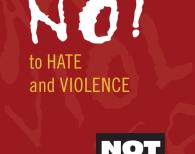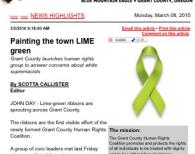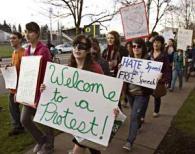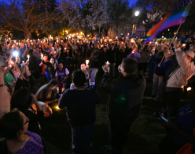Davis, CA community supports victim of anti-LGBT hate crime
CREDIT: Davis Enterprise
Three hundred people in Davis, CA attended a candlelit vigil on March 16 for Mikey Partida, a Davis resident who was badly beaten earlier this month in what police are investigating as a hate crime.
Oregon

Within hours of a fire bomb at a local mosque, citizens gathered to proclaim that hate was not welcome in Corvallis, Ore.
Local police discovered the arson at the city’s Salman Alfarisi Islamic Center early Sunday morning and quickly responded. The fire destroyed an office, but ignited the community.
Just two days before, 19-year-old Mohamed Osman Mohamud—who attended the mosque while a student at Oregon State University—was arrested in Portland, Ore. for an alleged plot to set off a bomb during the tree-lighting ceremony in the state’s most populous city. Local activists fear the Corvallis mosque bombing was retribution for the Portland incident.
“By Sunday afternoon, we were all calling each other, asking ‘How should we organize a response?” said Corvallis citizen Laurie Childers. Many acted individually, she added, by bringing flowers and cards to the mosque.

Oregon has just made it easier to report hate crimes--do it online.
That's what the Department of Justice came up with after a meeting of the LGBT community in Portland, called in response to gay-bashings in the city.
Sean Riddell (pictured above, on right), chief counsel for the criminal justice division of Oregon’s Department of Justice, was at the meeting, and was “struck by the number of people who said they’d been the victim of a hate crime and didn’t report it,” says Tony Green, Riddell’s colleague and DOJ spokesman.
Why don't people report hate crimes? Fear of retribution; embarrassment; maybe it's too hard to walk into a police station and fill out the forms. There are a lot of reasons; and that concerned the state's attorney general.

Eastern Oregon: Wayne Inman, the former Billings, Montana police chief who helped change the way law enforcement responds to hate crimes, shared his experience with a group of students and community groups in Eastern Oregon recently.

What role does local media play in addressing intolerance and hate crime prevention? In the past few weeks, we’ve seen three stories where media coverage took very different positions on addressing controversy and sparking conversation about these issues.

Update: People in Grant County are taking swift action to make sure the Aryan Nations stay away from their community. In the midst of a packed forum sponsored by the local newspaper, community members began organizing a lime green ribbon campaign. Tony Stewart and Norm Gissel, leaders of the Kootenai County Human Rights Task Force shared their successful strategies for dealing with the neo-Nazis. Read more in the Blue Mountain Eagle.
Grant County, OR: The Blue Mountain Eagle newspaper in John Day, Oregon, is sponsoring town hall forums this Friday, Feb. 26, to air community concerns about plans by the Aryan Nations to relocate its national headquarters to their small town.
When they heard that the hate group's leader was shopping around town recently, looking to buy property for a new compound, store owners and residents poured into the streets to proclaim that the white supremacist organization is not welcome in this community.

Eugene, OR: Students at the University of Oregon have been up in arms since the Pacifica Institute started holding meetings on their campus.
Pacifica Institute, deemed a white nationalist hate group by the Southern Poverty Law Center, insists it is merely providing a forum for speakers with diverse views. Recent speakers the group brought to the U of Oregon have called Martin Luther King, Jr. a "communist dupe," denied the Holocaust, and called the Russian Revolution a Jewish conspiracy. At a meeting last December, the Nazi salute was given.
Students have been protesting the group, both outside buildings where they appear and during meetings, demanding that they be banned from campus. University officials say they feel torn between the need to protect free speech, and the anti-tolerance message Pacifica's speakers convey. One student who left the school over the group's presence told reporters: "I do not want to be on a campus where the president talks about diversity and inclusiveness but still allows a hate group on campus."
Students and faculty at the University of Oregon in Eugene have been up in arms since the extremist Pacifica Institute started holding meetings on their campus.
Pacifica, deemed a hate group by experts, insists it is merely providing a forum for speakers with diverse views. Recent speakers at the U or Oregon have called Martin Luther King, Jr. a "communist dupe," others have denied the Holocaust and called the Russian Revolution a Jewish conspiracy. At a meeting last December, the Nazi salute was given.
Students have been protesting the group, both outside buildings where they appear and during meetings, demanding that they be banned from campus. University officials say they feel torn between the need to protect free speech, and the anti-tolerance message Pacifica's speakers convey.
What are the limits of free speech? Should there be different standards for schools, universities and other educational institutions? Has your school or town had to decide whether or not to host Pacifica Institute, or any similar group with extremist, hateful views?
